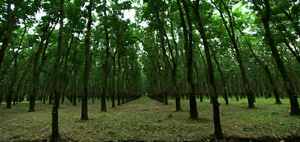 More land needs to be allocated towards the cultivation of rubber trees, according to Denis Low, the former president of the Malaysian Rubber Glove Manufacturers Association (Margma). He further said the government should implement strategic measures aimed at rejuvenating the country’s rubber industry
More land needs to be allocated towards the cultivation of rubber trees, according to Denis Low, the former president of the Malaysian Rubber Glove Manufacturers Association (Margma). He further said the government should implement strategic measures aimed at rejuvenating the country’s rubber industry
“Smallholders should be encouraged and given incentives to replant their rubber trees instead of allowing older trees to continue ageing and produce less latex,” he said.
Last month, the statistics department reported a 4.5% reduction in Malaysia’s natural rubber production, from 29,867 tonnes in June 2023 to 28,533 tonnes in July 2023.
Low said Malaysia became a major rubber glove producer due to its easy access to latex from its plantations and processing facilities, but this advantage had diminished over time.
“Today, Malaysia contributes just 15% of the supply, with Thailand and Vietnam making up the remaining 85%,” he added.
He also noted that roughly 65% of rubber gloves on the market were now manufactured using synthetic rubber, with the remaining 35% still made from natural rubber.
“However, this trend may change when more natural rubber gloves are needed to amplify the importance of ESG,” Low said.
ESG, which stands for environmental, social, and governance, refers to a set of criteria investors, businesses, and organisations use to evaluate the sustainability and ethical impact of an investment or business.
According to Low, the country’s severe shortage of rubber is driven by three main factors – the conversion of rubber plantations to other crops, such as oil palm, an ageing smallholder population that provides 70% of the rubber supply, and consistently low rubber prices that results in lower income for rubber producers.
